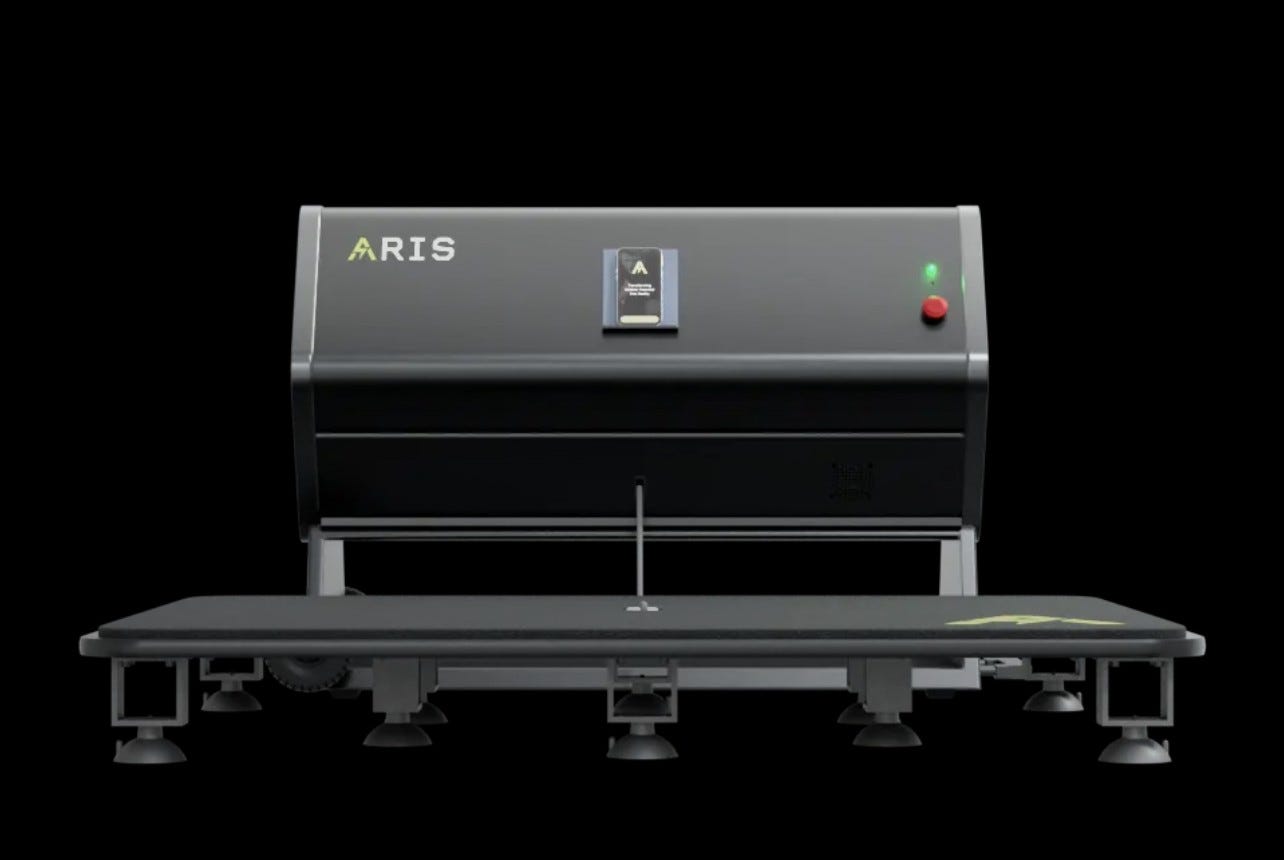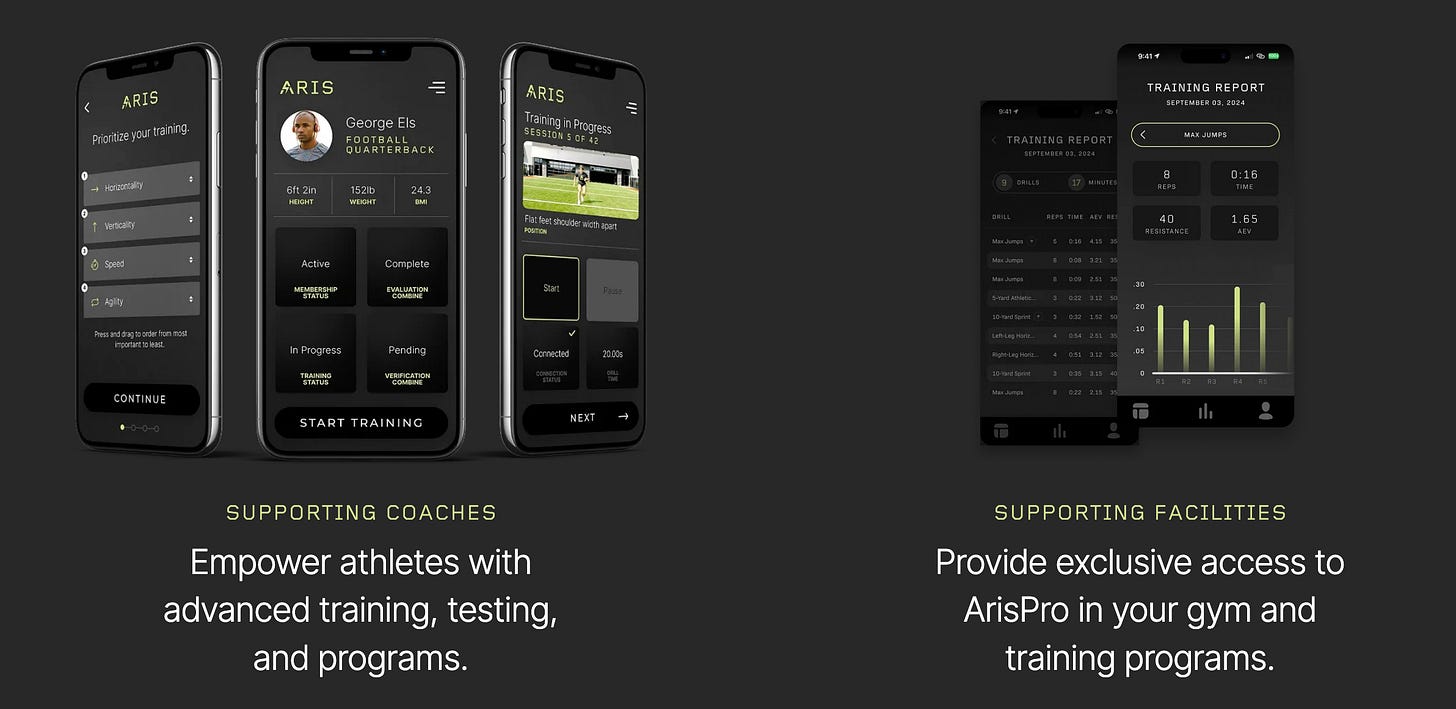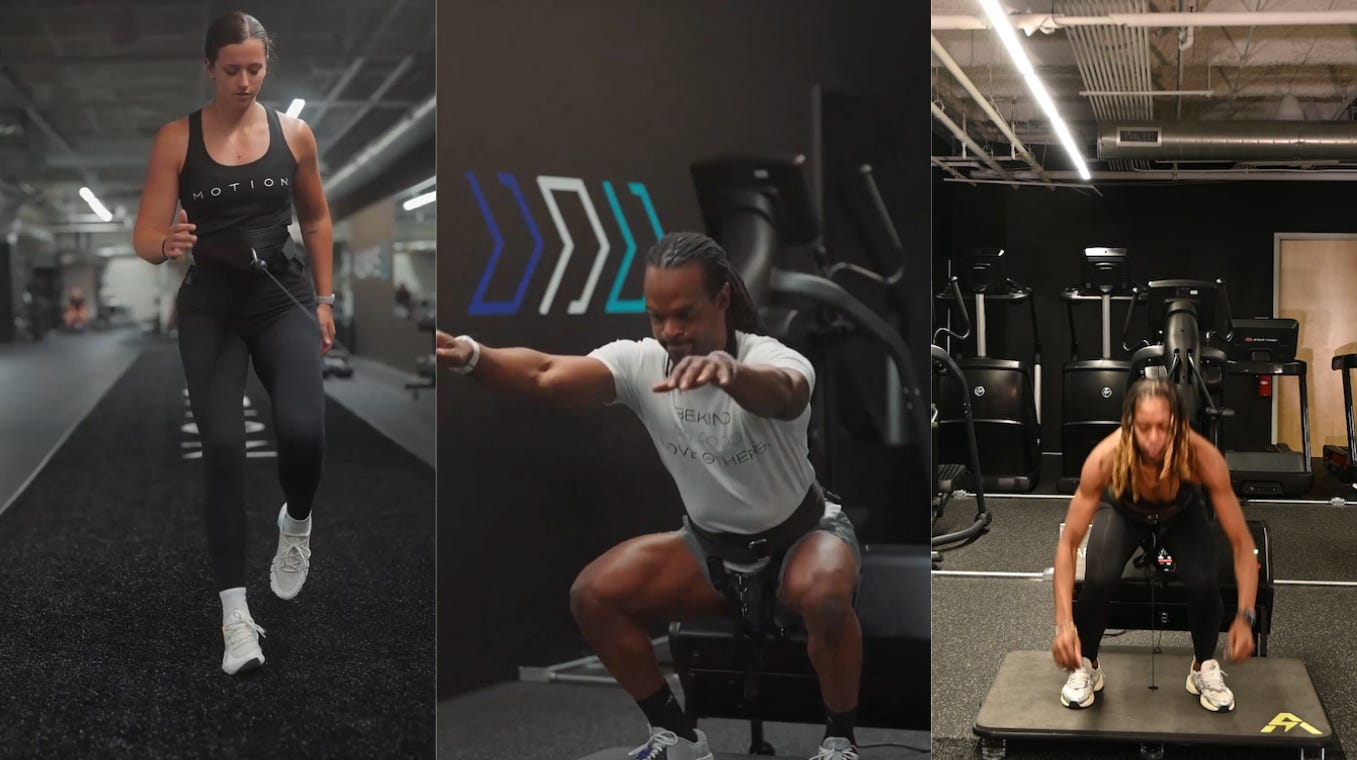Today we have the honor of interviewing Matt Eller, CEO of Aris Training, a leading platform in sports technology.
Aris Training is a next-generation resistance training system designed to help athletes build strength, speed, and power through controlled, variable resistance. Unlike traditional weight-based methods, Arise leverages advanced technology to adjust resistance in real time, allowing practitioners to fine-tune load, monitor performance, and reduce injury risk. It’s used across elite sports to replicate sport-specific movements, track progress with precise data, and optimize both rehabilitation and performance training.
You can watch the video interview below by clicking on the Youtube link. You can also listen to the audio interview by clicking on the link at the top of the page:
Here is the picture of the Aris Training machine:
Picture: Aris Training
Here is a picture of Aris Training’s mobile app:
Here is a picture of athletes using Aris Training:
📝Show Notes: Through this interview, we touched on his background, his company and product, the benefits for teams to use their product and platform. We also talked about his competitive advantage, business model, and his plans for the next 12 months.
Please note that Aris Training will be exhibiting at our 2025 Upside US Summit on October 21 at the Florida Panthers (NHL) stadium.
Here are the best quotes from the interview with Matt:
Q1. Tell me about background
“I’m a former basketball player, college basketball player at Lee McCrae College. After so many years in basketball, I was looking forward to a break, so I studied international business and had a chance to do some corporate sales within the food industry. I grew pretty fast and enjoyed it, but I knew it wasn’t what I wanted to do forever. Being young, I thought, this is my time to get back into my passion. I started really studying performance and getting into data analytics, and it kind of put me on a trajectory here in this industry that I’m really excited about.”
Q2. How did you get the idea of launching your company?
“My business partner, Sam Wason, and I shared a lot of common interests when it came to performance. For me, when I was getting recruited in high school, I was a 6’4 shooting guard, and people told me I wasn’t big enough or quick enough to guard certain players—even though I could put my elbow in the rim. I didn’t understand where those problems were coming from, and there weren’t coaches or options to test and understand my performance. That opened my eyes to the idea that everybody’s got an elite athlete inside of them; they just need the right process to bring it out. Once I became a trainer and opened a facility, I saw how manual and labor-intensive it was to do performance analytics for every athlete. We thought, there’s gotta be a better way to scale this and automate it so athletes don’t lose personal attention while coaches can still grow and manage their business effectively.”
Q3. Tell me about your product
“At the center of our ecosystem is Aris Pro, our digital resistance trainer. It delivers 100 pounds of constant resistance, meaning whatever resistance you program is consistent through the entire motion, whether it’s 25 yards or 12 inches. Everything operates through the Aris app, which allows coaches to command training sessions, capture data, and have it all automated so they can focus on the athlete instead of spending time on manual data collection. We’ve seen great improvements in acceleration and athletes reaching peak power faster using our resistance method. And because it’s tied into a complete athlete management system, coaches can easily manage speed, change of direction, and power output data by athlete, team, or sport, and generate custom reports for whatever they need.”
Q4. How is your product unique?
“It’s really about simplicity. With Aris Pro, it’s one tool—you don’t need speed gates, sleds, and other equipment alongside it. Every motion is testing and training at the same time. We’ve also built unique features to make the coach’s and athlete’s experience smoother, like audio signals that beep when you cover 10 or 20 meters, and safety zones that stop athletes from bursting through the resistance line at the end of a rep. Those things make training safer, easier, and more precise. Our focus has been: how do we simplify and amplify the process? And that’s what sets us apart—we’re giving athletes and coaches an effective, all-in-one tool that just works.”
Q5. What gives you a competitive advantage?
“We pride ourselves on building a tool that can handle the highest level of athlete performance while staying simple to use. For example, with football, you’ve got 250–300 pound guys generating massive force. Many products struggle with that, but we’ve built a system that can withstand it. At the same time, we’ve integrated features like audio cues, safety zones, and automated data capture that support coaches as much as athletes. Every rep isn’t just training, it’s also testing, so they’re always collecting valuable data without having to add extra steps. That’s where we feel our advantage lies—building something powerful enough for elite athletes but easy enough that coaches can integrate seamlessly into training without losing time or accuracy.”
Q6. What are the benefits for teams?
“For teams, the biggest benefit is versatility. Coaches can create specific workouts for athletes, execute them, review the data, and make adjustments later. It gives them the ability to be in many places at once. Teams use it for activation before games, for testing, and especially for return-to-sport protocols. Having baseline data on an athlete’s peak performance makes it much easier to plan their comeback after an injury. We also designed it with accessories and processes for vertical jump, change of direction, and linear speed, so it’s not just one type of training—it’s a complete, flexible system that can integrate into any organization’s workflow without friction.”
Q7. What is your take on the resistance training market?
“Right now the resistance training market is complicated and fragmented. There are a lot of great, sophisticated products out there, but for most coaches, that’s not what they need day-to-day. Eighty percent of coaches and organizations really just want four or five key data points that they can work with and apply directly to training. The challenge is integration, setup, and usability—it’s often tough to get everything to work together smoothly. But resistance training is such a critical part of sports performance—every team needs sprinting data, power output data, and change-of-direction metrics. I think the market will keep growing, but more importantly, it will start to commercialize and become more accessible to athletes beyond just the top 1%. As innovation continues, coaches’ hunger for clear, actionable data will drive the market toward easier, more transparent solutions.”
Q8. What are your plans for the next 12 months?
“We’re currently raising capital for the release of our Version 2 system, which we plan to launch in 2026. Alongside that, we’re building machine learning and AI modules that help with velocity thresholds and personalized training to reduce the burden on coaches and adapt training to individual athletes. But what we’re most excited about is the launch of Aris Suite, which includes our Aris Flight vertical jump tester with LIDAR sensors—like a modernized version of a Vertec plate—and our Aris Speed gates. These tools will integrate seamlessly into the Aris platform, so all the training and testing data is centralized in one place. It allows teams to test more athletes faster, with athletes even able to do it more self-sufficiently, while coaches still get accurate, actionable data without losing time.”
You may also like:















